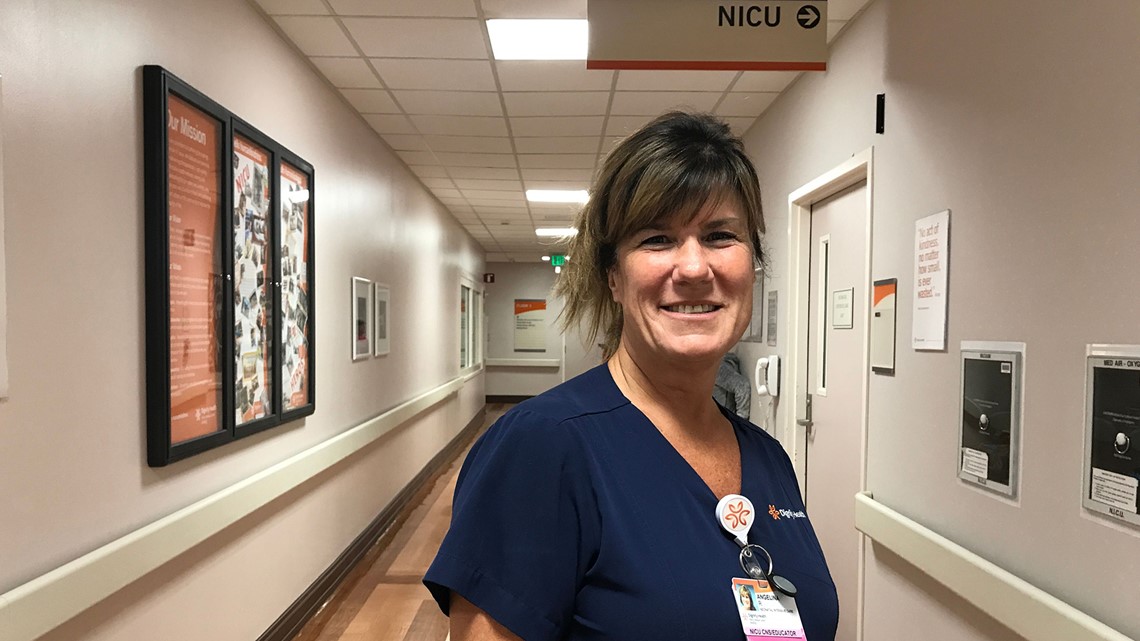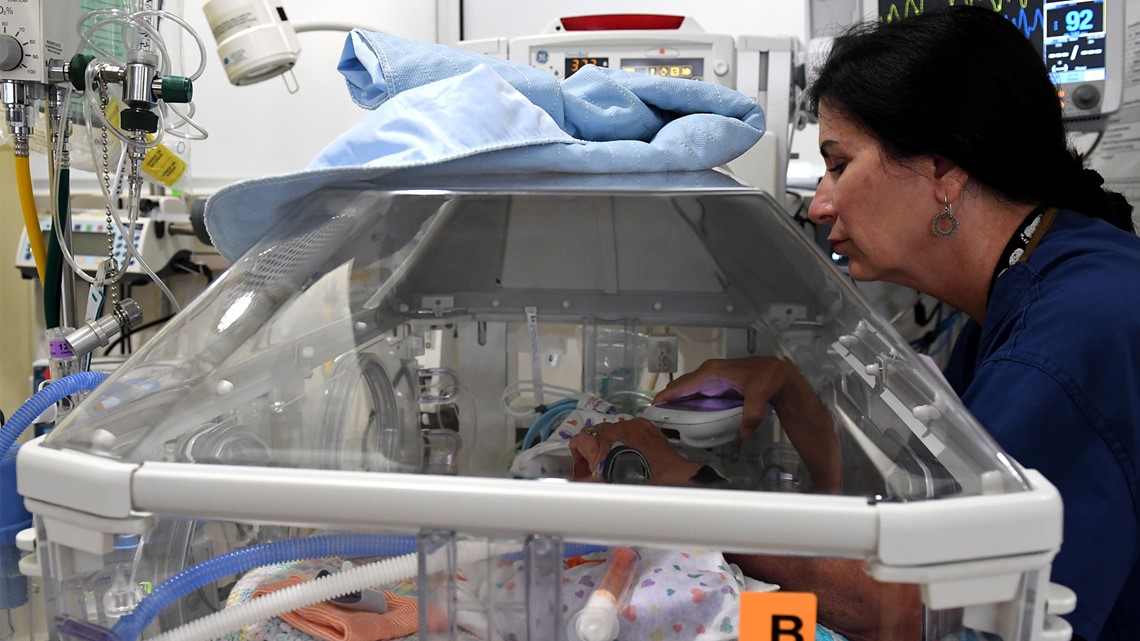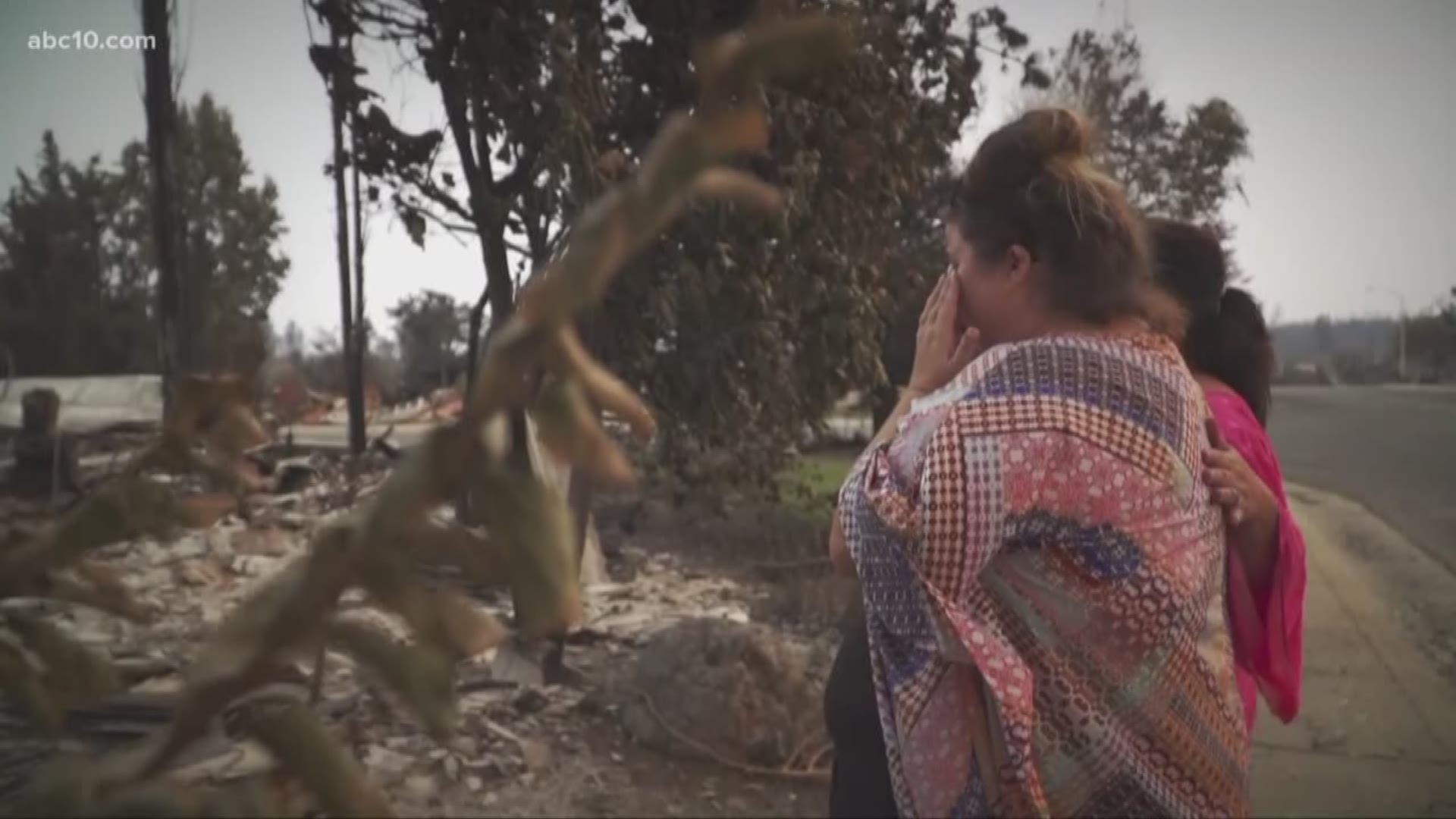The Carr Fire is old news by now.
It’s been burning a few days in the wooded areas west of Redding. Downtown, where Mercy Medical Center perches on a hill like a Medieval fortress, is even further east.
But as Angelina Robinson-Faxon drives to the hospital for her shift on the evening of July 26, she literally sees red.
Mercy’s mirrored side — usually a cool-colored reflection of the sky and town beneath it — is showing her flames.
And before she even gets inside, the neonatal intensive care unit's charge nurse for the night knows how she'll be spending it.
“I’m now responsible for getting these babies to safety,” she tells herself.
Among the thousands evacuated on that most perilous night, some were particularly vulnerable. Robinson-Faxon and other leaders who faced those most difficult challenges as the Carr Fire roared into town July 26 shared their stories with the Record Searchlight.
From the chief executive officer of a hospital in the path of the fire to the pregnancy advocate who marched around town to find expectant and postpartum women in need, these are first-hand accounts of that night and the uncertain days that followed.
"From my front window, it was the most tragic thing I've ever experienced," said Chris Jones, CEO of Vibra Hospital of Northern California. "And then I went through the hospital and it was the most beautiful thing I'd ever experienced ... what they were doing with our patients."
Mercy hasn't been evacuated, but rumors about it have been swirling since Wednesday. And with how long it takes to carefully transport the fragile babies the NICU oversees, the hospital doesn’t have the luxury of waiting for the word.
Robinson-Faxon prays, goes inside and huddles with staffers to figure out what to do.
They start filling out evacuation forms, just in case.
They put evacuation bags and other equipment in the right spot, just in case.
Her boss is telling her to set the tone in the NICU — just in case.
“Reassure the nurses. Stay calm,” she tells her. “Just take care of your babies.”


By 7:30 p.m., someone is calling for the neonatologist to come, and Robinson-Faxon knows it’s really happening.
The doctor rushes in and makes it official.
“Angelina, I need you to get on the phone," he tells her, "and I need you to get accepting hospitals for these babies."
She knows it won’t be easy — NICU babies require one-on-one transport because of all the equipment that keeps them alive. One of them only weighs about 2.5 pounds.
They'll need ambulances. And helicopters. And cardiac monitors. And, of course, beds — eight of them.
She calls UC Davis Medical Center, which agrees to take the babies. But it’ll be a while before they can iron out the complicated combination of ambulance-helicopter transport.
And there are tougher calls to make in the meantime — to the parents already fearing for the children’s lives.
For Robinson-Faxon, it's personal. All three of her children were NICU babies.
“They’re all grown and healthy and fine, but the emotional connection I have with these parents is huge,” she says.
Nerves are starting to unravel inside the hospital, where nurses are worrying about their homes and a doctor breaks down when he finds out his own house is being evacuated.
Robinson-Faxon feels like she snapped at her coworker. She'll apologize when there’s time, but that won't be until a few days later.
Her teenage son is texting her about everyday things like going to hang out at his friend’s house.
She'll end up apologizing for her response to him, too.
“We are all feeling the impact,” Robinson-Faxon says. “It’s high stress, high adrenaline, emotional, is my house OK?”
But more than anything, she’s thinking about the parents again.
“I’m evacuating my house,” she hears them saying in her head, “my baby’s being taken from me.”


It’s finally midnight by the time the first baby leaves.
Robinson-Faxon flies with one. She's glad to do it because she can console the parents.
“I could give them a hug as I brought their baby in,” she says.
By 2 a.m., the babies are gone. Robinson-Faxon is relieved, but she wasn’t prepared to suddenly say goodbye. She doesn't know whether she'll ever see them again.
By Sunday, people are already talking about bringing the babies back. But the fire is still only 5 percent contained. And Robinson-Faxon’s NICU-mom terror kicks in again.
“Really, please, guys, don’t do that yet,” she tells them. “Please — not yet. Because these parents cannot deal with another evacuation.”
More than a week later, a few are back, but some either ended up being discharged or are still admitted in other hospitals.
Robinson-Faxon believes God made sure she was working that night because she has extensive knowledge of the NICU’s transport system.
And more than that, she would know what the NICU parents needed most.
“I feel like I was supposed to be there,” she says. “And yet, God help me, I wish I wasn’t.”
Robinson-Faxon still doesn't feel emotionally recovered. But she thinks about how much worse it would have been if the NICU were at its full capacity of 16 babies. And how eager everyone was to help the ones who were there — the other nurses and doctors, the outside hospitals.
Because she knows not everyone was so lucky.
She thinks about Melody Bledsoe and her great-grandchildren Emily Roberts, 4, and 5-year-old James Roberts, who died as the fire took over their house around the same time she was starting her shift that night.
“That story of the grandma with her wet towel over her grandbabies — just, thank God we have each other,” she says. “We’re all alive.”
Elisa Knopf is trudging across an evacuation center parking lot with a backpack full of infant formula when she sees a pregnant woman giving her water to a dog.
It's morning, about 9 or 10. But this is Redding in July, so it's already hot.
Knopf is a doula, a pregnancy and postpartum care advocate. With her job as director of North State Doula Program, seeing an expecting mother do something so selfless doesn't surprise Knopf.
But she's glad she caught this one in the act. Because a pregnant evacuee in the heat needs someone to look out for her, too.
By this point, Knopf's own clients have pretty much all fled to other parts of the West Coast. But Knopf and her team aren't going to let an official roster get in the way of their mission to help new moms.
Not with the Carr Fire causing so much misery.
"They're without structure, and they don't feel safe," she says. "I have never seen such desperation."
They go to another shelter.
Studies about the importance of maternal health are nagging at Knopf, how the neurological and bodily changes that happen during pregnancy make expecting mothers "the most vulnerable person in the community."
Finally, they find another pregnant woman. She just wants clean underwear.
"She's sleeping here in this church with these people she doesn't know, and she's expecting a child," says Amanda Mattney, manager of the program.
Knopf, Mattney and teammate Carissa Ballew don't see many other pregnant women, but the ones they do find are in "extreme crisis."
They tell them all the same thing.
"We're looking out for you while you're experiencing this crisis. We're still dedicated to taking care of your emotional needs."
In her few free moments, Knopf starts wondering why hardly any pregnant women are at the evacuation shelters in town.
Then it clicks.
"There is such a disparity in this community," she thinks. "The women who have transportation and the means, left ... If you're pregnant or you're postpartum, your instincts are high. You become an animal."
By Friday night, Knopf and her team head to Mercy Medical Center to look for parents who need help after delivery.
The sky is red and, on its horizon, a family is loading their newborn up to evacuate, just hours after giving birth.
They haven't even figured out their new car seat.
Knopf and her team help, but they leave frustrated there isn't more they can do.
"Women were birthing during this disaster and then not able to go home," she says. "That's just a level of crisis that is new to me."
She puts a post on Facebook to grow their reach, and the responses start flooding in.
"I'm out here with my uncle on his property with a trailer, and there's tons of other people, and we have nothing left because the fire was coming in the back door," one woman writes her.
By 11 p.m., the team has a list of women to find Saturday.
By Sunday, they're setting up a distribution site to hand out all the donations they've gotten.
Some people seem confused by them — "you hippie doulas," Knopf imagines them thinking.
But by the end of the weekend, they've given out diapers and food to 150 families — to crying fathers and grandfathers who don't know how to handle their kids, to proud women who seem embarrassed to be asking for help.
"I've never needed help. I'm so tired. I have to go to work," they say.
In those moments, Knopf realizes the emotional release the team offers them is just as important as the diapers.
"She can't function right now. She's not functioning when she comes to us," Knopf says. "She breaks down, she kind of falls apart, because it's finally a safe place for her."
Jones can see flames from her office on Eureka Way.
But it's the popping that gets to the Vibra CEO.
"Propane tanks bursting," she says. "The dust in the parking lot that just kicked up like small tornadoes ... eerie."
Still, Jones knows she can't move her 77 recovering patients easily.
Maybe she won't have to.
"The fire's moving in a different direction, but we're ready," a California Department of Forestry and Fire Protection firefighter tells her. "Trust us."
Jones goes back inside and walks around to check in with everyone. Her staff has already readied all the patients with their charts clipped to their wheelchairs, which touches her.
But for now, no one else seems that bothered.
As Jones heads up to the second floor, where her most critical patients are, she can't say the same for herself.
She tries to calm herself by thinking about the firefighter's words.
"Our goal is to save all lives," he had said, "And we will protect the hospital."
They have two buses ready outside. Hospitals in other cities are prepared to take the patients.
By 11:30 p.m. — hours after the fire attacked the city limits — Vibra is still standing and no one's evacuated.
But the fire is still uncomfortably close.
Jones thinks of the firefighter and her frail patients, how evacuating actually could hurt them.
She makes an announcement.
"I think it's time to put everyone to bed."
Over a week later, Jones believes that the firefighter made the right call by telling them to stay put.
"As I turned and looked at the staff and what they were doing," she says, "It was truly one of the most beautiful experiences."

